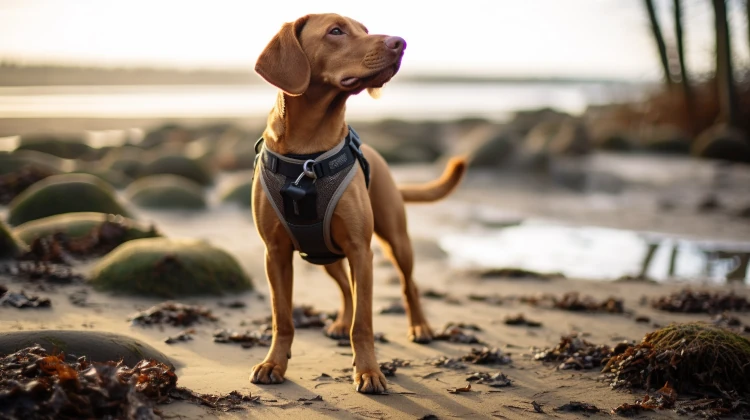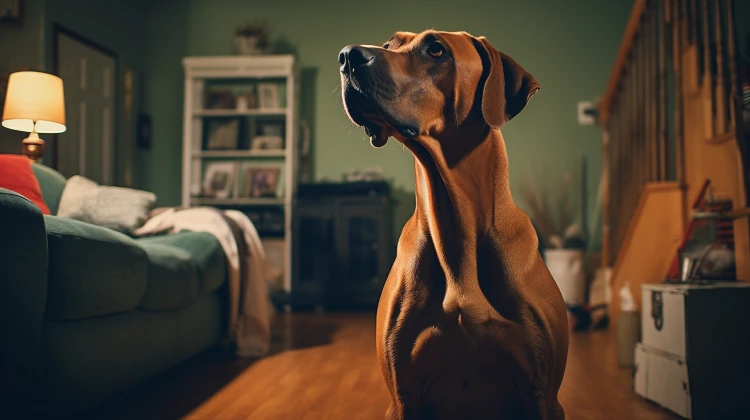Are you interested in adding a Rhodesian Ridgeback to your family, but concerned about potential allergies? If so, you’re not alone; many people struggle with dog-induced allergies.
This guide answers the question “Are Rhodesian Ridgebacks Hypoallergenic?” by exploring their breed traits and offering helpful tips to reduce allergens for allergy sufferers. Keep reading to find out if this loyal and intelligent breed could be the right fit for your household.
Table of contents
Key Takeaways
- Rhodesian Ridgebacks are not considered hypoallergenic dogs, but their single – layered coat and regular grooming can help minimize allergens.
- Regular brushing is essential for reducing allergens in Rhodesian Ridgebacks’ coats and promoting overall coat health.
- Maintaining a healthy diet, encouraging good hydration habits, and using hypoallergenic dog shampoos can also help reduce allergens in Rhodesian Ridgebacks.
Overview of Rhodesian Ridgebacks

In the world of dog breeds, Rhodesian Ridgebacks hold a unique and storied position. Originating from Southern Africa, these dogs were initially bred to serve as hunting partners for the Khoikhoi people, providing excellent tracking skills while also offering companionship.
Over time, this breed built up quite a reputation as a brave and formidable guard dog; they were even dubbed “Lion Dogs” due to their ability to keep lions at bay while their human counterparts made the kill.
The distinct characteristic of Rhodesian Ridgebacks is their single-layered coat with a hallmark ridge running along its back – an attribute that lends them their name. Varying between light wheaten to red wheaten in color, this sleek yet robust coat doesn’t shed excessively compared against other canine varieties but can still cause allergic reactions in sensitive individuals.
Despite not being hypoallergenic dogs per se, regular grooming and care can ensure minimal shedding and allergens.
What Are Hypoallergenic Dogs

Hypoallergenic dogs, as the term suggests, are breeds that are less likely to trigger allergies in sensitive individuals. They possess certain qualities such as minimal shedding or producing lower amounts of dander which make them more tolerable for allergy sufferers.
The primary cause of dog allergies is not hair itself but the proteins present in a dog’s dead skin, often known as ‘dander,’ urine and saliva. These proteins get airborne and lead to allergic reactions when breathed in by hypersensitive people.
But bear in mind; no dog breed is 100% hypoallergenic because all dogs shed fur and dander to some degree. Some pet owners may find that they react less severely to certain breeds compared to others due to variation in individual human immune responses as well as differences between breeds.
Investigating the Hypoallergenic Nature of Rhodesian Ridgebacks

Are Rhodesian Ridgebacks truly hypoallergenic? Let’s delve into the causes of dog allergies and explore whether or not these beautiful dogs are suitable for allergy sufferers.
Causes of Dog Allergies
Dog allergies spring from an over-reactive immune system. When a dog licks its fur, the saliva left behind dries and becomes airborne, spreading allergens throughout your living space.
Dander is another culprit; these tiny flakes of dead skin are shed by every dog breed but may be more prolific in some breeds than others, causing allergic reactions. Additionally, traces of urine left on fur after a pet urinates can also trigger allergic symptoms in sensitive individuals.
Histamines are released into the body as a defense mechanism against these allergens, leading to common allergy symptoms such as sneezing and itching.
Hair Shedding in Rhodesian Ridgebacks
Rhodesian Ridgebacks have short hair and are known to shed less than some other breeds, but they still experience hair shedding. Shedding is a natural process for dogs, and Rhodesian Ridgebacks have a medium level of shedding.
This means that they will still lose some hair regularly throughout the year. Regular grooming and brushing can help minimize shedding by removing loose hair from their coat before it ends up on your furniture or clothes.
So if you’re considering adopting a Rhodesian Ridgeback, be prepared for some level of regular shedding upkeep.
Grooming Tips for Reducing Allergens in Rhodesian Ridgebacks

Regular brushing, maintaining a healthy diet, encouraging good hydration habits, and using hypoallergenic dog shampoos can help reduce allergens in Rhodesian Ridgebacks. Read on to learn more about these helpful grooming tips!
Regular Brushing
Regular brushing is essential for Rhodesian Ridgebacks to help reduce allergens and keep their coat healthy.
- Brush the dog’s coat at least two to three times a week.
- Use a bristle brush or rubber brush that is suitable for the dog’s coat type.
- Start by gently brushing the dog’s back and work your way down to the tail.
- Pay attention to areas with longer hair, like the mane and ridge on the back, as they can trap more allergens.
- Be gentle while brushing to avoid irritating the dog’s skin.
- Brush in the direction of hair growth to remove loose hair and dander effectively.
- Brushing should be done outside or in an area with good ventilation to prevent allergens from spreading indoors.
- Dispose of the removed hair properly, so it doesn’t cause any allergic reactions.
- Check for any matting or tangles during brushing and gently untangle them using your fingers or a detangling comb.
Maintaining a Healthy Diet
A healthy diet for Rhodesian Ridgebacks can help reduce allergens. Here are some tips to consider:
- Feed your dog a balanced and nutritious diet, rich in vitamins and minerals.
- Include omega – 3 fatty acids in their diet, which can contribute to healthier skin and coat.
- Avoid feeding your dog foods that contain common allergens such as grains, soy, and artificial additives.
- Consider adding probiotics to their diet to support a healthy gut and immune system.
- Provide your dog with fresh, clean water at all times to promote hydration and overall health.
Encouraging Good Hydration Habits
Proper hydration is crucial for the overall health and well-being of Rhodesian Ridgebacks. Here are some tips to encourage good hydration habits:
- Provide clean and fresh water: Ensure that your Rhodesian Ridgeback always has access to clean, fresh water. This will encourage them to drink regularly.
- Offer multiple water sources: Place water bowls in different areas of your home, especially if you have a large house or multiple floors. This makes it more convenient for your dog to stay hydrated throughout the day.
- Monitor water intake: Keep an eye on how much water your Rhodesian Ridgeback is drinking each day. This will help you identify any changes in their hydration levels and ensure they are staying properly hydrated.
- Water bowl placement: Consider placing water bowls in shaded areas or indoors to keep the water cool and prevent it from becoming warm or stagnant.
- Use interactive toys: Invest in toys that release small amounts of water as your dog plays with them. This can make drinking more fun and engaging for your Rhodesian Ridgeback.
- Try flavored water: If your dog is hesitant about drinking plain water, consider adding a small amount of low-sodium chicken broth or bone broth to their bowl, making it more enticing for them to drink.
- Set a routine: Establish a regular schedule for offering water to your Rhodesian Ridgeback, such as after meals, playtime, and walks. Consistency can help reinforce good hydration habits.
Using Hypoallergenic Dog Shampoos
Hypoallergenic dog shampoos can help reduce allergens in Rhodesian Ridgebacks. These shampoos are specially formulated to be gentle on the skin and reduce irritation. They can also help remove dander and other allergens from the dog’s coat, making them a great option for allergy sufferers. By using hypoallergenic shampoos regularly, you can minimize the risk of triggering allergies and enjoy a cleaner and healthier environment for both you and your furry friend.
Alternatives to Rhodesian Ridgebacks for Allergy Sufferers
For allergy sufferers who are unable to bring a Rhodesian Ridgeback into their home, there are several alternative dog breeds to consider.
Xoloitzcuintli
Xoloitzcuintlis, also known as Mexican Hairless Dogs, come in both coated and hairless varieties. They are loyal and protective companions, making them a great alternative for allergy sufferers looking for a hypoallergenic dog breed.
Xoloitzcuintlis have minimal shedding and produce less dander compared to other breeds, helping to minimize allergic reactions. With their unique appearance and loving nature, Xoloitzcuintlis can be a wonderful choice for those with allergies who still want the joy of owning a dog.
Basenji
Basenjis are a great option for those with allergies who are considering adopting a dog. These hypoallergenic dogs have short, fine hair that doesn’t shed as much as other breeds. They have a single-layered coat, which means minimal grooming is needed to keep their hair in good condition.
Basenjis are small to medium-sized dogs that typically weigh between 22-24 pounds. In addition to being hypoallergenic, Basenjis also have a unique yodel-like bark instead of the traditional barking sound.
Irish Water Spaniel
Irish Water Spaniels are a popular choice for allergy sufferers looking for a hypoallergenic dog breed. These intelligent and loyal dogs have a unique appearance, with their curly coat and distinctive “rat tail.” One of the great benefits of owning an Irish Water Spaniel is that they have a non-shedding coat, making them less likely to trigger allergies.
However, it’s important to note that this breed does require regular grooming to maintain the health of their coat and prevent matting. With their hypoallergenic qualities and wonderful temperament, Irish Water Spaniels make excellent companions for those with allergies.
Bedlington Terrier
Bedlington Terriers are an excellent alternative for allergy sufferers who may be allergic to Rhodesian Ridgebacks. These dogs have a coat that can be high maintenance, requiring regular grooming to keep it in top shape.
However, their caring and gentle personalities make them fantastic family pets. Bedlington Terriers are also known for their brilliant watchdog abilities. They are hypoallergenic dogs, which means they produce fewer allergens and are less likely to trigger allergies in sensitive individuals.
These unique terriers have a distinctive appearance with their curly coats and lamb-like faces, making them quite popular among dog lovers. Their hypoallergenic nature coupled with their loyal and protective nature makes Bedlington Terriers an ideal choice for families seeking a low-allergen companion who will still keep an eye out for any intruders or dangers.
Conclusion
Rhodesian Ridgebacks may not be hypoallergenic dogs, but there are still ways to manage allergies if you’re determined to have one as a pet. Regular grooming and brushing will help reduce dander and allergens in their coat.
Additionally, maintaining good hygiene habits for your dog, such as using hypoallergenic shampoo and encouraging hydration, can also minimize allergic reactions. Remember to consult with a healthcare professional before making any decisions about getting a Rhodesian Ridgeback if you have allergies.
FAQs
No, Rhodesian Ridgebacks are not hypoallergenic dogs as they have a short coat that sheds moderately. This shedding can release allergens into the environment.
Yes, some people may develop allergies to Rhodesian Ridgebacks due to their shedding and dander. These allergies can cause symptoms such as sneezing, itching, and watery eyes.
To reduce allergies if you own a Rhodesian Ridgeback, regular grooming and bathing can help minimize shedding and dander. Keeping your home clean and using air purifiers or allergen-reducing products may also be beneficial.
Yes, there are hypoallergenic dog breeds that produce fewer allergens or have hair instead of fur. Some examples include the poodle, bichon frise, and Portuguese water dog. However, it’s important to note that individual reactions to dogs vary, so allergies should still be considered before owning any breed of dog.





